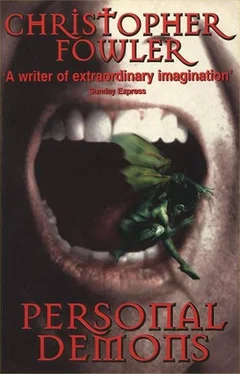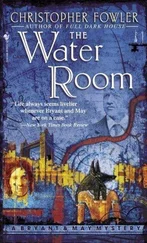Christopher Fowler - Personal Demons
Здесь есть возможность читать онлайн «Christopher Fowler - Personal Demons» весь текст электронной книги совершенно бесплатно (целиком полную версию без сокращений). В некоторых случаях можно слушать аудио, скачать через торрент в формате fb2 и присутствует краткое содержание. Жанр: Триллер, на английском языке. Описание произведения, (предисловие) а так же отзывы посетителей доступны на портале библиотеки ЛибКат.
- Название:Personal Demons
- Автор:
- Жанр:
- Год:неизвестен
- ISBN:нет данных
- Рейтинг книги:4 / 5. Голосов: 1
-
Избранное:Добавить в избранное
- Отзывы:
-
Ваша оценка:
- 80
- 1
- 2
- 3
- 4
- 5
Personal Demons: краткое содержание, описание и аннотация
Предлагаем к чтению аннотацию, описание, краткое содержание или предисловие (зависит от того, что написал сам автор книги «Personal Demons»). Если вы не нашли необходимую информацию о книге — напишите в комментариях, мы постараемся отыскать её.
A hotel offers a taboo service for its troubled clients, a vampire library attacks its readers, and a young man discovers the cutlery of the Marquis de Sade. Incarceration, incantations, romance, revenge and the end of the world occur in this collection of gothic tales.
Personal Demons — читать онлайн бесплатно полную книгу (весь текст) целиком
Ниже представлен текст книги, разбитый по страницам. Система сохранения места последней прочитанной страницы, позволяет с удобством читать онлайн бесплатно книгу «Personal Demons», без необходимости каждый раз заново искать на чём Вы остановились. Поставьте закладку, и сможете в любой момент перейти на страницу, на которой закончили чтение.
Интервал:
Закладка:
And then a real moment came to him.
A dead, hot day in mid-July The air is countrified, dandelion spores rising gently on warm thermals, the lazy drone of a beetle alighting on dust-dulled hedge leaves. A suburban summertime, where the South London solstice settles in a sleepy yellow blanket over still front gardens.
Westerdale Road has its characters; the bad-tempered widow who appears in her doorway at the sound of a football being kicked against a wall, the deaf old couple whose pond freezes over every winter, so that they have to thaw their goldfish from a block of ice in a tin bath beside the fire. Some of the houses have Anderson shelters in their gardens, converted to tool-sheds in time of peace. Others still keep chickens, a distinctive sound and smell that excites the neighbourhood cats. Further along the street is a 'simple' man who sits on his front step smiling inanely in the bright sunlight .
Masters forced himself to remember, to stop himself from ceasing to exist. These weren't his memories, he realised with a shock, they belonged to someone else entirely. What were they doing in his head?
Many street names conjure pastoral imagery; 'Combedale Road', 'Mycenae Road', 'Westcombe Hill'. At noon the silent sunlight scorches the streets. Housewives stay deep within the little terraced houses, polishing sideboards, making jellies, listening to wirelesses in cool shadowed rooms. Their men are at work, mopping their brows in council offices, patrolling machine-room floors, filling out paperwork in dusty bank chambers. Their children are all at school, reciting their tables, catching beanbags, and in the break following lunch there is a special treat; the teacher unlocks a paddock behind the playground of Invicta Infants, and here is a haven from the hot concrete, a small square meadow of close-cropped emerald grass hemmed in with chicken-wire. Here we are allowed to lie on our stomachs reading comics, passing them between each other. It is peaceful, warm and quiet (the teachers do not tolerate the vulgarity of noise) and although we are in a suburban street, it feels like the heart of the countryside. And here is the heart of all remembered happiness .
Confused, Masters began crying as the carriages dissolved around him and tumbled away through the night sky, the foundations of his life evaporating as he fought to recall anything at all that made him human.
What was it about this area, what did it possess to make it so special, so irreplaceable and precious? A few roads, a pond behind a wall where sticklebacks were trapped in jars and dragonflies skimmed the oily water, a railway line with a narrow pedestrian tunnel beneath it, a station of nicotine-coloured wood and rows of green tin lamps along the platform. Some odd shops; a perpetually deserted furniture showroom, damp and dark, its proprietor standing ever-hopefully at the door, a model railway centre, a tobacconist selling sweets from large jars, a rack of Ellisdons jokes on a stand, none of them living up to their packet descriptions, a chemist with apothecary bottles filled with coloured water and a scale machine, green and chrome with a wicker weighing basket, a bakery window filled with pink and white sugar mice, iced rounds, meringues and Battenburg cake. An advertisement painted on a wall, for varnish remover of some kind, depicting a housewife happily pouring boiling water from a kettle on to a shiny dining room table. Cinema posters under wire. A hardware shop with tin baths hanging either side of the door.
This confluence of roads and railway lines is bordered by an iron bridge and an embankment filled with white trumpet-flowered vines, and populated by families with forgotten children's names; Laurence, Percy, Pauline, Albert, Wendy, Sidney. No ambitions and aspirations here, just the stillness of summer, the faint drone of insects, bees landing on flowerbeds in the police station garden, tortoises and chickens sheltering from the heat beneath bushes, cats asleep in shop windows with yellow acetate sunscreens, and life being lived, a dull, sensible kind of life, unfolding like a flower, the day loosening as slowly as a clock spring – an implacable state which children thought would never change, but which is now lost so totally, so far beyond reach that it might have occurred before Isis ruled the Nile .
The lecturer had no memories of his own because he did not truly exist. Just like any flesh and blood human being, the creation that was Harold Masters reached his time unexpectedly and without resolution, and so dissolved into a tumble of threadbare tissues. With no plot momentum to drive him and no memories of his own, just borrowings from the mind of his creator, he turned over and over into nothing and was gone. And in that moment, he was the most real.
The storyteller in the mind's eye of Harold Masters sits at his chipped writing desk staring up at shelves of books, his eye alighting on an old 78 rpm record, and it dawns on him that he took Masters' name from the label, which features a dog and a gramophone. He wonders how many other characters' names came from spines of books and recollections of friends. A video of Brief Encounter , a copy of Dracula , a photograph of New York, a lottery ticket, a drawing of a phoenix, a brandy bottle, a hotel brochure, a dog's collar, an Arsenal scarf, childhood notes. He looks for the patterns that shape his own life and finds only tarmac, concrete and steel, the dead carapace of something lost to all but his mind's eye.
His own past is as dead as his – and Masters' – recollection of it. Dr Beeching closed the branch lines, road planners cut the streets in half, smashed down the houses, constructed swathes of concrete through the hills, the roads, the railways, the gardens, and like a bush cut through at the root, everything familiar died. The shops of his childhood were boarded up, homes falling to the wrecking ball, friends divided, families relocated. Now oil-drenched vibrations pulse the once-still air. A bright patch of pavement remains where once he stood with his face to the sun, free as the sky .
That was his reality.
Everything now is fiction.
They feel different, he notes, fact and fantasy. The former rooted in observation and experience, the latter bound by publishers' conventions. Sitting in the small cold study, the storyteller determines to leave behind his outmoded world of locked-room mysteries and vampire soaps in search of something real. But how hard will it be to leave such a cosy niche for a place with endless horizons and no perameters? Even letting go has a learning process.
He pushes back his chair and goes to the open window, inventing as hard and as fast as he can. It is a beautiful spring morning, and the breeze causes his eyelids to flutter. There is brine in the air. He looks down from the window-ledge at the thin white clouds racing far beneath, then loosens his belt and steps out of his trousers. It only takes a moment to remove his T-shirt, pants and socks. Drawing a deep breath, he walks confidently out on to the rope-covered surface of the springboard, determined not to show that he is scared.
How the releasing of shackles makes his body feel lighter than air.
Poor old Harold Masters, not being allowed to finish his story. It was so obvious to see where his tale was going that there was simply no reason for the author to finish it himself, not when his readers could put together the clues and do the job for him. The burden is always on the author to rediscover ways of surprising his audience, and that task has been fulfilled, albeit in a rather unorthodox manner.
It's good to be standing at the edge, he tells himself, bouncing lightly on the balls of his feet. There's a new world ahead. As the old century closes, he can leave behind his plots and characters. There are some excellent practitioners of the art who seem more than happy to close up the store behind him. There will always be the attraction of lies.
Читать дальшеИнтервал:
Закладка:
Похожие книги на «Personal Demons»
Представляем Вашему вниманию похожие книги на «Personal Demons» списком для выбора. Мы отобрали схожую по названию и смыслу литературу в надежде предоставить читателям больше вариантов отыскать новые, интересные, ещё непрочитанные произведения.
Обсуждение, отзывы о книге «Personal Demons» и просто собственные мнения читателей. Оставьте ваши комментарии, напишите, что Вы думаете о произведении, его смысле или главных героях. Укажите что конкретно понравилось, а что нет, и почему Вы так считаете.












